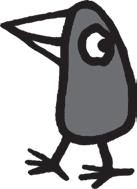
S 1 DC
DONOT CRO S
ALEXANDRA BEEVER & sol linero
and other CRIME - FIGHTING jobs


and other CRIME - FIGHTING JOBS

1
To Imogen – for a curious person, life is an adventure waiting to be discovered – and to Lillie, whose curiosity kindled dreams she lived and loved by.
A.B.
To my curious little kids, Ulises and Eloisa. Love, Mom. S.L.
First published 2023 by Nosy Crow Ltd
The Crow’s Nest, 14 Baden Place, Crosby Row, London, SE1 1YW, UK
Nosy Crow Eireann Ltd
44 Orchard Grove, Kenmare, Co Kerry, V93 FY22, Ireland
www.nosycrow.com
ISBN 978 1 78800 809 9 (HB)
ISBN 978 1 83994 126 9 (PB)
Nosy Crow and associated logos are trademarks and/or registered trademarks of Nosy Crow Ltd
Text © DC Alexandra Beever 2023
Illustrations © Sol Linero 2023
The right of DC Alex Beever to be identified as the author and Sol Linero to be identified as the illustrator of this work has been asserted.
All rights reserved.
This book is sold subject to the condition that it shall not, by way of trade or otherwise, be lent, hired out or otherwise circulated in any form of binding or cover other than that in which it is published. No part of this publication may be reproduced, stored in a retrieval system, or transmitted in any form or by any means (electronic, mechanical, photocopying, recording or otherwise) without the prior written permission of Nosy Crow Ltd.
A CIP catalogue record for this book is available from the British Library.
Printed in China.
Papers used by Nosy Crow are made from wood grown in sustainable forests.
9 8 7 6 5 4 3 2 1 (HB)
9 8 7
5 4 3 2 1 (PB)
1 2 5
10
10
6
3 4 CONTENTS WHAT IS A DETECTIVE? 4 WHY DO WE NEED DETECTIVES? 6 THE HISTORY OF DETECTIVES 8 HOW DO YOU BECOME A DETECTIVE? 10 WHAT TRAINING DOES A DETECTIVE NEED? 12 WHAT HAPPENS WHEN A CRIME IS REPORTED TO THE POLICE? 14 HOW DOES A DETECTIVE LOOK FOR CLUES? 16 WHAT HAPPENS WHEN YOU FIND A SUSPECT? 18 WHAT HAPPENS WHEN A PERSON GOES TO COURT? 20 WHAT OTHER CRIME-FIGHTING JOBS ARE THERE? 22 DO YOU LIKE VEHICLES? THEN ONE OF THESE JOBS MIGHT BE FOR YOU 24 WHAT ABOUT A JOB IN CRIMINAL SCIENCE? 26 ARE YOU GOOD AT GATHERING INFORMATION AND KEEPING SECRETS? THEN TRY ONE ONE OF THESE JOBS 28 WHAT ABOUT THE MORE UNUSUAL CRIME-FIGHTING JOBS? 30 GET INVOLVED! 32
WHAT IS A DETECTIVE
You might have read about detectives in books or seen them in films and on TV, hunting for clues and solving mysteries. But what actually are they?
A detective is a specially trained police officer whose job it is to investigate crimes. Using their skills and training, detectives uncover the truth about what has happened in order to find the person responsible for the crime.
Detectives have to investigate and solve all kinds of crimes, from fake documents and stolen belongings to people getting hurt or going missing.
POLICE
Detectives spend a lot of time speaking with the people who were affected by a crime (victims) and anyone who saw a crime happen (witnesses). They also interview people who they think might have committed a crime (suspects).
4
POLICE
1 2
DID YOU KNOW?
The word detective comes from the Latin word detectus, which means to uncover the truth.
A detective’s office is inside a police station. There is a lot of secret information held there, so it’s important that it is kept secure and members of the public are not allowed to enter.
Detectives need some special equipment to help them with their job:
POLICE
Identification to prove that they are a detective.
A police radio to call for help or ask for extra police officers.
Disposable gloves to wear at crime scenes to stop evidence being damaged.
A notebook and pen to make notes
A mobile phone to take pictures of evidence and contact people.
31 THU
5
WHY DO WE NEED DETECTIVES
Police officers are always working to protect people, in order to make our towns, cities and countries safer places to live in. But some crimes are more serious and complicated than others, so we need detectives to solve them.
It is the detective’s job to collect as much information as possible to solve the crime. This is called a criminal investigation and the material collected is called evidence. Evidence can be anything from a fingerprint to a blood stain. It must all be collected and recorded correctly by the detective, as it could hold the key to cracking the case.
Detectives are experts at finding clues and investigating them. People leave lots of clues behind, even if they are trying hard not to be caught committing a crime. Some might not seem important to ordinary people, but detectives are trained to collect many small clues and piece them all together, a bit like solving a giant jigsaw puzzle.
5 4 3 EVIDENCE 6 6
Often, crimes are not as simple as they seem. Sometimes criminals work in groups, known as Organised Crime Groups (OCGs), and we need the skills of detectives to identify them. Some undercover officers even wear a disguise and pretend to be a member of a criminal gang. They can watch and listen out for evidence to help the police catch these criminals.
DID YOU KNOW?
Crimes can take a long time to solve because some evidence has to be sent to special laboratories to be examined.
EVIDENCE
We also need detectives to search for missing people. If someone gets lost or goes missing, detectives gather lots of information and use special technology to find out where they are and why they went missing.
1 2 8 7
7
THE HISTORY OF DETECTIVES
People have been fighting crime and trying to solve mysteries for thousands of years, but when did detectives first appear?
The first private detective agency was founded in Paris by Eugène François Vidocq, a French detective who used to be a criminal.
Kate Warne, an American member of the Pinkerton Detective Agency, became the first female detective in the world.
CRIMESCENEDONOTCROSS CRIME CRIMESCENEDONOTCROSS CRIME
Sir Howard Vincent published his Police Code, explaining that no one should touch a dead body or crime scene before the police arrive.
The first detective story, The Murders in the Rue Morgue by Edgar Allan Poe, was published.
THE MURDERS IN THE RUE MORGUE EDGAR ALLAN POE
Alphonse Bertillon, a French criminologist, invented the Bertillon System. By recording body measurements and features of criminals, he was able to identify hundreds of repeat criminals.
The Adventures of Sherlock Holmes by Arthur Conan Doyle was published. Sherlock Holmes is the world’s most famous fictional detective.
8
1841 1833 1881 1892 1856 1879
Fingerprints were used as evidence for the first time. The case took place in West Bengal, India.
DID YOU KNOW?
DNA can be found at crime scenes in blood, skin cells, hair and saliva. It is unique to each person and often criminals leave it behind without realising.
A German engineer called Walter Bruch designed the first Closed-Circuit Television (CCTV) camera.
For the first time, someone was convicted (found guilty) of murder using DNA evidence.
The first training course for detectives opened in the USA. Some of the first countries to send officers there were China, Canada and Great Britain.
Automatic Number-Plate Recognition (ANPR) was invented. It allows detectives to track criminals using the number plates on their cars.
Drones began to be used by the police. They are small, remote-controlled vehicles that can fly in bad weather and help search for people or objects.
E 1M0 G 3 N
9
1M0 G3N
1898 1935 1942 1976 1988 2000




